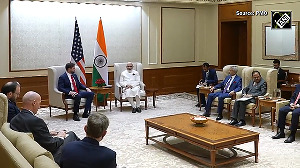While many may dismiss the Left's barks as mere public posturing, they cannot be ignored, not least because they impact the stock markets and dampen the general economic sentiment. The delayed monsoon is already doing its bit to mar growth prospects for the current fiscal.
If one looks at the general election results objectively, it is clear that the people's mandate is definitely not for the extreme economic ideologies of the Left parties.
The Indian National Congress, which was the originator of reforms in 1991, emerged as the single-largest party with 145 seats. The BJP, which was equally reform-oriented, if not more, came a close second with about 138 seats.
The two parties, Congress and BJP put together, bagged more than 50 per cent of the total 542 Lok Sabha seats. And this vote is for pursuing economic reforms in right earnest. The CPI won just 10 seats and the CPI (M) 43. Yes, the Left parties did stage a comeback, but their total strength is just over 60, and does not in any way indicate that the country has bought their economic arguments.
It may be argued that reforms do not merely mean an increase in the foreign direct investment limits in insurance, telecommunications and civil aviation. But the investment needs in these sectors are vital to increase the reach of life insurance beyond the urban metros, increasing the telephone penetration in villages and sprucing up the airports.
The Left parties want a higher interest rate on the Employees Provident Fund. So they have sought a rollback of the proposed FDI limit increases that Finance Minister P Chidambaram has proposed in his Budget. With outside support to the UPA and little stake in the government, this is asking for too much.
In a recent post-Budget discussion with the Confederation of Indian Industry, Chidambaram had just one favour to seek from the industry. "Why don't you convince your friends about an increase in the FDI limit in insurance from the present 26 per cent to 49 per cent?" he asked one of the CEOs.
The Congress leaders, time and again, speak of being the original reformers. And nobody ever doubts the credentials of the troika comprising Prime Minister Manmohan Singh, Chidambaram and Planning Commission Deputy Chairman Montek Singh Ahluwalia.
The prime minister was closely involved in the Budget-making process, having held as many as half-a-dozen meetings with his finance minister. If ministry officials are to be believed, Singh realised that the Budget had to reflect the CMP priorities. So, he took extra care in ensuring that the sensitivities as well as economic concerns of his party's allies were addressed by his finance minister.
During the past two months - unfortunately for the UPA - the outlook for the Indian economy has witnessed quite a change. The BJP's India Shining campaign may have boomeranged since it did not strike a chord with rural India. And the UPA has now brought agriculture, education, health and rural development back into focus.
Chidambaram has set aside Rs 10,000 crore (Rs 100 billion) for the Planning Commission with a clear brief that India's poor will have a first charge on the funds. But the funds would serve no purpose unless Singh forces states to overhaul their delivery mechanism. Massive allocations towards health, family welfare and other social objectives represent a leaking bucket with only a fraction of the funds reaching the end consumer.
Ahluwalia has the tough task of initiating wide ranging talks with various ministries to assess their funding needs. Most of the social ministries and departments have a poor track record in spending money. None of them has a good enough absorptive capacity to exhaust the funds already allocated to it. Much of the spending is generally bunched in the last quarter leading to poor utilisation.
The finance minister has already made up his mind to partially roll back the 0.15 per cent transaction tax proposed in the Budget on July 8, following a revolt by the share-broking community. And the Left parties are waiting next for a rollback of the FDI in telecom and insurance.
Obviously, Singh was always in the loop while Chidambaram was tying the Budget loose ends. But he can do little but reason it out with the Left, which has threatened to bite and stop barking if it is not heard.
With such hair-tearing complexities, the troika faces a tough task in living up to its reputation.







 © 2025
© 2025